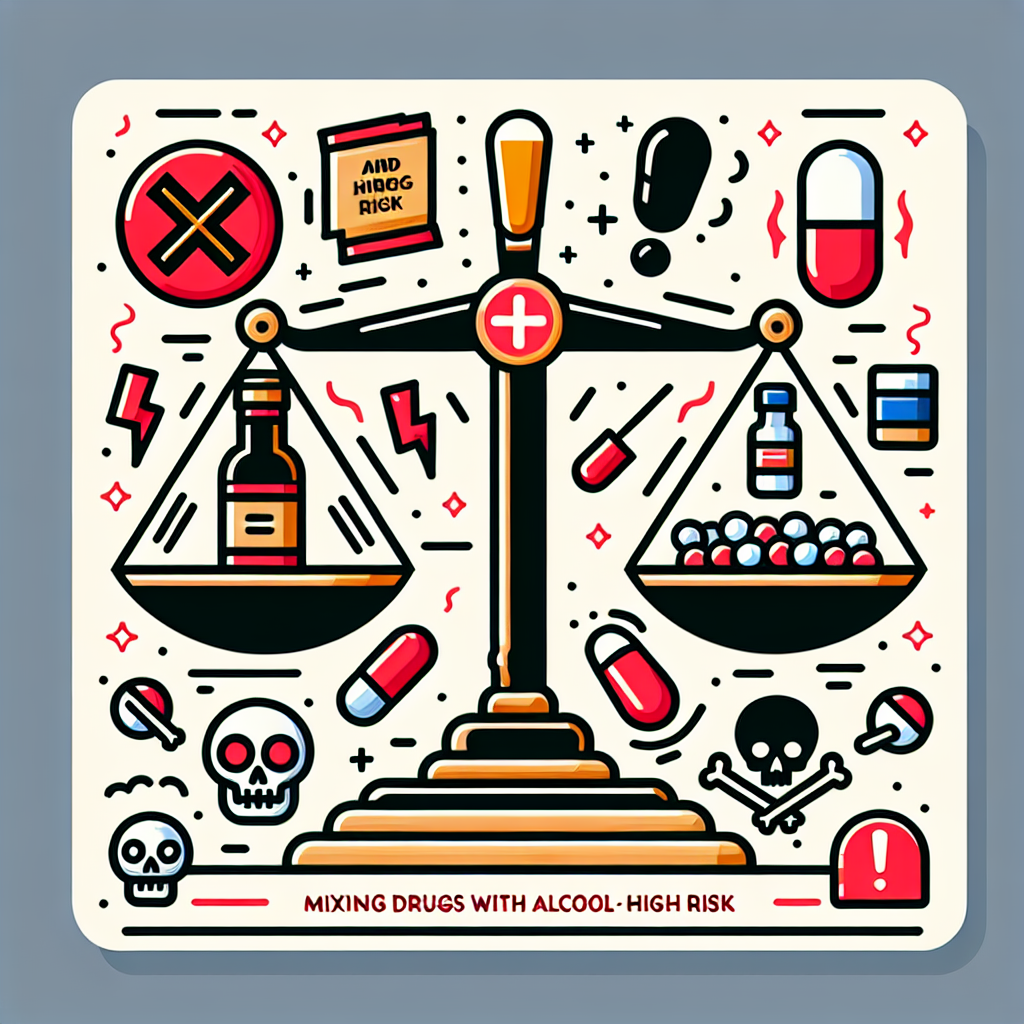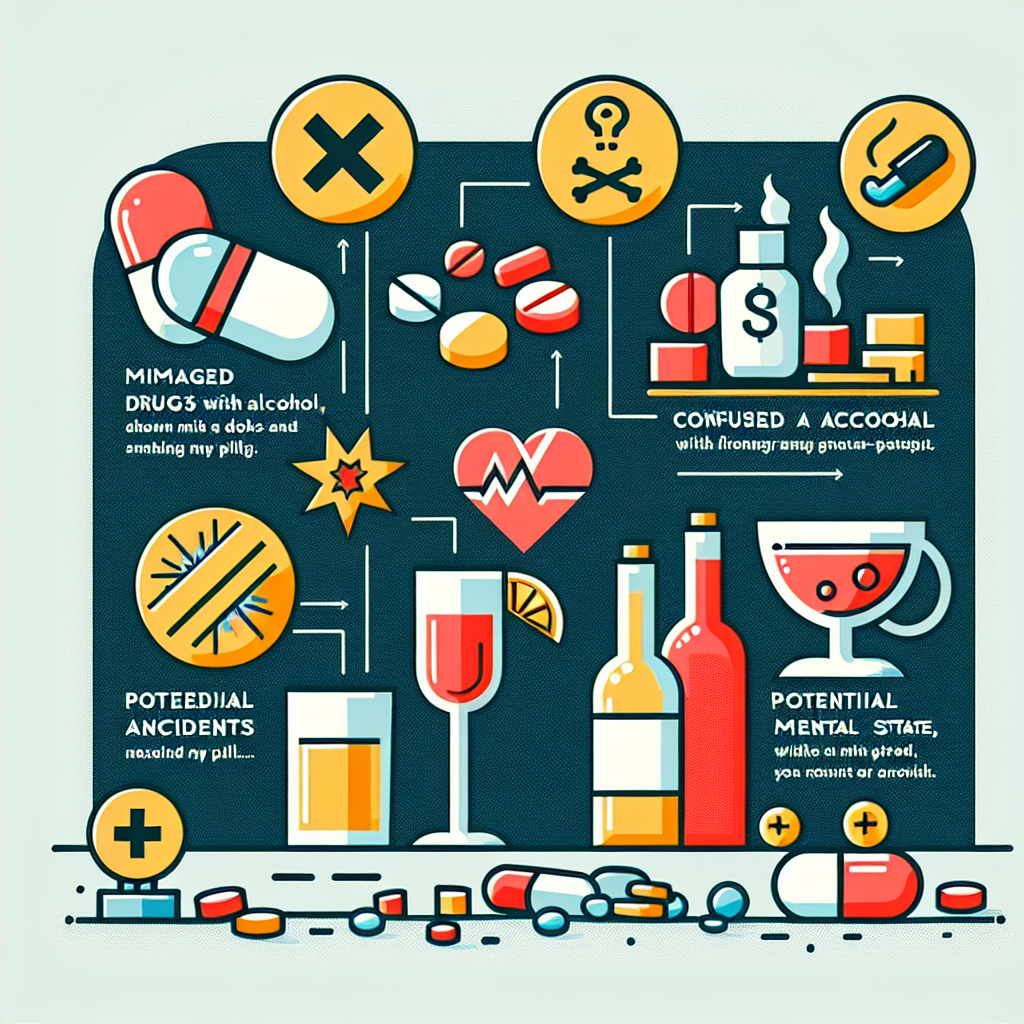-
Table of Contents

“Mixing Drugs with Alcohol: A Deadly Cocktail of Risks.”
Introduction
Mixing drugs with alcohol can pose significant dangers to an individual’s health and well-being. The combination can lead to unpredictable and often severe interactions, as alcohol can amplify the effects of many drugs, both prescription and recreational. This can result in heightened side effects, increased risk of overdose, and potentially life-threatening conditions such as respiratory depression, heart failure, or severe dehydration. Additionally, the cognitive and motor impairments caused by this combination can lead to accidents, injuries, and risky behaviors. Understanding these dangers is crucial for making informed decisions about substance use and safeguarding one’s health.
Health Risks Of Combining Drugs And Alcohol
Mixing drugs with alcohol is a perilous practice that can lead to severe health risks, both immediate and long-term. Understanding these dangers is crucial for making informed decisions about substance use. When alcohol is combined with drugs, the effects of both substances can be amplified, leading to unpredictable and often dangerous outcomes. This combination can impair judgment, coordination, and reaction times, significantly increasing the risk of accidents and injuries.
One of the most immediate dangers of mixing drugs with alcohol is the potential for overdose. Alcohol can enhance the sedative effects of certain drugs, such as opioids and benzodiazepines, leading to respiratory depression, unconsciousness, and even death. The liver, which processes both alcohol and many drugs, can become overwhelmed, resulting in toxic levels of substances in the bloodstream. This can cause acute poisoning, which requires immediate medical attention.
Moreover, the combination of alcohol and stimulants, such as cocaine or amphetamines, can place immense strain on the cardiovascular system. While alcohol is a depressant, stimulants increase heart rate and blood pressure. This conflicting interaction can lead to arrhythmias, heart attacks, or strokes. The false sense of sobriety that stimulants can provide may also lead individuals to consume more alcohol than they normally would, further exacerbating the risk of alcohol poisoning.
Chronic use of alcohol and drugs together can have long-term health consequences. The liver, already burdened by processing alcohol, can suffer from increased damage when drugs are added to the mix. This can lead to liver diseases such as cirrhosis or hepatitis. Additionally, the brain’s chemistry can be significantly altered, leading to cognitive impairments, memory loss, and mental health disorders such as depression and anxiety. The risk of developing substance use disorders also increases, as the body becomes more dependent on the combined effects of alcohol and drugs.
Social and psychological consequences are also significant. The impaired judgment resulting from mixing substances can lead to risky behaviors, such as unsafe sexual practices, which increase the risk of sexually transmitted infections. Relationships with family and friends can become strained, and professional and academic performance can suffer. The cycle of addiction can lead to isolation, financial difficulties, and legal problems, further compounding the negative impact on one’s life.
Despite these dangers, there is hope and help available for those struggling with substance use. Education and awareness are key components in preventing the harmful effects of mixing drugs with alcohol. Support from healthcare professionals, counselors, and support groups can provide the necessary tools and encouragement to overcome addiction. Rehabilitation programs offer structured environments where individuals can detoxify safely and learn coping strategies to maintain sobriety.
In conclusion, the health risks of combining drugs and alcohol are profound and multifaceted. From the immediate dangers of overdose and accidents to the long-term consequences on physical and mental health, the impact can be devastating. However, by understanding these risks and seeking help, individuals can make positive changes towards a healthier, more fulfilling life. It is never too late to take the first step towards recovery and to embrace a future free from the dangers of substance abuse.
The Impact Of Mixing Prescription Medications With Alcohol
Mixing prescription medications with alcohol is a perilous practice that can have severe and sometimes fatal consequences. While it may seem harmless to enjoy a drink while taking medication, the combination can lead to unpredictable and dangerous interactions. Understanding the risks involved is crucial for anyone who is prescribed medication and consumes alcohol.
One of the primary dangers of mixing drugs with alcohol is the potential for enhanced side effects. Many medications, particularly those that affect the central nervous system, such as antidepressants, anti-anxiety medications, and painkillers, can cause drowsiness, dizziness, and impaired coordination. When alcohol, a depressant, is added to the mix, these effects can be amplified, leading to an increased risk of accidents and injuries. For instance, the combination can severely impair one’s ability to drive, operate machinery, or even perform simple tasks safely.
Moreover, alcohol can interfere with the effectiveness of medications. Some drugs require a specific concentration in the bloodstream to work correctly, and alcohol can alter the way the body metabolizes these medications. This can result in either a reduced therapeutic effect or an increased risk of toxicity. For example, certain antibiotics and antifungal medications can become less effective when taken with alcohol, potentially leading to prolonged infections and complications.
Additionally, the liver plays a crucial role in metabolizing both alcohol and many medications. When both substances are consumed simultaneously, the liver is forced to work overtime, which can lead to liver damage over time. This is particularly concerning for individuals who are on long-term medication regimens or who consume alcohol regularly. Chronic liver damage can result in conditions such as cirrhosis or liver failure, which are life-threatening and often irreversible.
Furthermore, mixing alcohol with medications can exacerbate underlying health conditions. For individuals with mental health disorders, such as depression or anxiety, alcohol can worsen symptoms and counteract the benefits of their prescribed treatments. Alcohol is a known depressant and can lead to increased feelings of sadness, hopelessness, and anxiety, making it more challenging for individuals to manage their mental health effectively.
It is also important to consider the social and psychological implications of mixing drugs with alcohol. The combination can lead to risky behaviors, poor decision-making, and impaired judgment. This can strain relationships, affect job performance, and lead to legal issues, such as driving under the influence (DUI) charges. The social stigma and potential legal consequences can further compound the stress and anxiety experienced by individuals, creating a vicious cycle that is difficult to break.
In light of these dangers, it is essential to approach the use of alcohol and prescription medications with caution and responsibility. Open communication with healthcare providers is vital. Patients should always inform their doctors about their alcohol consumption habits and ask about potential interactions with their prescribed medications. Healthcare providers can offer guidance on safe practices and may adjust medication dosages or recommend alternative treatments to minimize risks.
Ultimately, the goal is to prioritize health and well-being. By understanding the dangers of mixing drugs with alcohol and taking proactive steps to avoid these risks, individuals can lead healthier, more fulfilling lives. Making informed choices and seeking support when needed can pave the way for a safer and more balanced approach to managing both medication and alcohol consumption.
Q&A
1. Mixing drugs with alcohol can significantly increase the risk of overdose, as both substances can depress the central nervous system, leading to slowed or stopped breathing, unconsciousness, and even death.
2. Combining drugs with alcohol can impair cognitive and motor functions more severely than either substance alone, increasing the likelihood of accidents, injuries, and risky behaviors.
Conclusion
Mixing drugs with alcohol can lead to severe health risks, including heightened side effects, increased toxicity, impaired cognitive and motor functions, respiratory depression, and potentially fatal overdose. The combination can also exacerbate mental health issues, lead to risky behaviors, and complicate medical treatments. It is crucial to avoid combining these substances to prevent these dangerous and potentially life-threatening outcomes.



